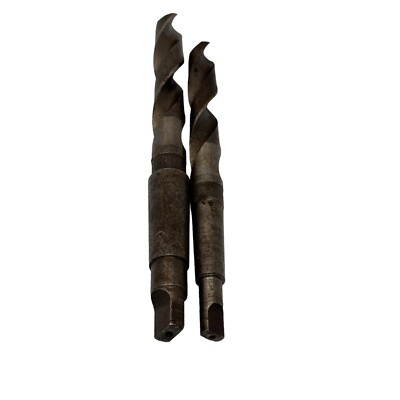In the field of metal processing, High-Speed Steel (HSS) twist drill bits remain the mainstay of drilling tools due to their excellent comprehensive performance. HSS material itself possesses high hardness and toughness, enabling stable wear resistance and good cutting efficiency under various working conditions. This material can withstand significant mechanical impact and thermal load during processing, ensuring smooth drilling operations. Although the hardness of HSS drill bits is slightly lower compared to cobalt alloys or HSS composite materials, their superior machinability and cost-effectiveness make them an ideal choice for medium- to low-speed drilling and processing of various materials. Especially in manufacturing, HSS twist drill bits meet a wide range of drilling applications by balancing performance and price to address different levels of processing demands.

With continuous advancements in material science and surface treatment technologies, high-performance coatings such as Titanium Nitride (TiN) and Titanium Aluminum Nitride (TiAlN) have become important means to enhance the performance of HSS twist drill bits. These advanced coatings not only significantly improve the wear resistance and high-temperature resistance of the drill bits but also effectively reduce friction between the drill and the workpiece surface, lowering heat accumulation in the cutting zone. TiN coatings, characterized by their golden appearance and good hardness, are widely used in medium- to low-speed processing scenarios. TiAlN coatings, which form a stable aluminum oxide protective layer under high temperatures, greatly enhance heat resistance, making them especially suitable for high-speed cutting and drilling difficult-to-machine materials. The application of coatings improves chip evacuation efficiency and reduces cutting resistance, allowing the drill bits to maintain lower temperatures and slower wear rates during processing, thus extending tool life.
In practical applications, coated HSS drill bits are suitable not only for conventional metal materials such as steel, non-ferrous metals, and alloys but also widely used for drilling plastics, wood, and other non-metallic materials. By reasonably setting processing parameters and selecting tools, HSS twist drill bits can achieve efficient drilling while ensuring hole diameter accuracy and smooth hole wall surfaces. In modern manufacturing, production efficiency and processing quality are important indicators of tool performance. The introduction of coating technology allows HSS drill bits to operate stably at higher cutting speeds and loads, meeting diverse processing needs.
Furthermore, the development of coating technology has promoted innovation in drill bit design. Combining coatings with optimized geometric structures, drill bits have achieved significant improvements in cutting efficiency, chip evacuation, and heat resistance. Modern HSS twist drill bits often adopt optimized helix angles and cutting edge designs paired with advanced coatings, which not only increase drilling speed but also extend tool life, reduce downtime for tool changes, and improve overall production efficiency.
Due to their outstanding performance and wide applicability, HSS twist drill bits play an irreplaceable role in industrial manufacturing. Their application range covers metals, plastics, wood, and other materials, meeting the drilling needs of various substrates. In metal processing, HSS drill bits are widely used for drilling steel, non-ferrous metals, and various alloys, especially suitable for medium- to low-speed processing environments. To ensure drilling quality and extend tool life, proper setting of cutting speeds and feed rates is particularly important. Different materials require different processing parameters due to variations in hardness, toughness, and thermal conductivity. For example, soft metals such as aluminum alloys are suited to higher cutting speeds and larger feed rates, while hard metals like stainless steel require lower speeds and more controlled feed rates. Proper parameters not only reduce tool wear but also effectively prevent workpiece deformation and hole diameter deviations, thereby improving processing efficiency and product quality.
Drill bit design plays a critical role in processing outcomes, especially the selection of cutting edge angles and helix angles, which directly affect cutting performance and chip evacuation efficiency. Generally, larger helix angles help quickly evacuate chips and are suitable for high-speed machining of soft materials, while smaller helix angles better suit hard materials, enhancing cutting stability and preventing chip clogging. Optimized cutting edge angles can reduce cutting resistance and heat generation, effectively extending tool life. At the same time, reasonable design can improve hole accuracy, reduce hole wall roughness, and lower the occurrence of processing defects. With increasingly stringent quality requirements in modern manufacturing, detailed optimization of drill bit design is a key factor in improving production efficiency and processing stability.
To further improve economic efficiency and environmental protection, regrinding management is an indispensable part of HSS drill bit maintenance. High-speed steel's excellent regrindability allows worn drill bits to be restored to their cutting edge shape through professional regrinding processes. Scientific and standardized regrinding can effectively extend tool life, reduce tool replacement frequency, and lower production costs, greatly enhancing a company's economic benefits. Meanwhile, promoting regrinding helps reduce the generation of used tools and industrial waste, aligning with green manufacturing and sustainable development trends. This recycling approach not only protects the environment but also enhances corporate social responsibility and market competitiveness.
Moreover, regrinding management requires corresponding equipment and skilled technicians to ensure the dimensions and geometry of re-sharpened tools meet processing requirements. Through reasonable regrinding schedules and monitoring systems, companies can achieve real-time tool condition control, arrange timely regrinding, and avoid quality issues or production stoppages caused by tool performance degradation. In the future, with the development of intelligent manufacturing, regrinding management is expected to integrate with digital tools to realize intelligent monitoring and precise maintenance throughout the tool lifecycle, further improving production efficiency and resource utilization.
HSS twist drill bits have a very wide range of applications in manufacturing, covering industries such as machining, automotive repair, and electronics manufacturing. With continuous advancements in manufacturing processes, HSS drill bits demonstrate excellent adaptability and flexibility in meeting diversified processing demands. Their material advantages, technological upgrades, and environmental cost benefits enable them to maintain strong competitiveness in the market.
The table below summarizes the characteristics of HSS twist drill bits in terms of material performance, coating technology, design optimization, and regrinding management:
| Item |
Description |
| Material Performance |
Good toughness and hardness, suitable for medium- to low-speed processing of various materials |
| Coating Technology |
TiN and TiAlN coatings improve wear resistance and tool life |
| Design Optimization |
Adjustments of cutting edge and helix angles enhance cutting efficiency and chip evacuation |
| Regrinding Management |
Multiple regrinds extend tool life, reduce costs, and lower environmental impact |
| Application Range |
Suitable for drilling metals, plastics, wood, and other materials |
| Industry Application |
Widely used in machinery manufacturing, automotive repair, electronics manufacturing |
As the manufacturing industry increasingly demands efficient, precise, and environmentally friendly tools, HSS twist drill bits continue to play an irreplaceable role. They have become an essential tool choice in modern machining processes. Looking forward, with the continuous emergence of new materials and technologies, HSS twist drill bits will keep contributing to improving machining efficiency, reducing manufacturing costs, and supporting green manufacturing initiatives.








